Aggression, and speaking his mind, have at times landed Shastri in controversy. But he doesn’t care. “If I’m passionate about something, and you ask me a question, I will tell you how I feel,” he says, as the national cricket coach pads up for a new innings by rolling out 23 Yards, a men’s personal care grooming brand. Very often, he lets on, when you say what you feel, people are shocked. “It’s okay. I never had an agenda,” says the all-rounder, who is donning the hat of an entrepreneur at 58. Does age matter? “It’s never about age. It’s just another number,” he says. “I enjoyed my career and I was extremely passionate about the game.”
Explaining the rationale behind the brand name, Shastri explains it’s his philosophy of going that extra yard. For him, the passion now is to make a mark on the business pitch. Does he fear failure? “Absolutely not,” he replies with his signature swag. One day, he says, you’re a hero, the next day a zero. And cricket has prepared him for these glorious uncertainties of life. “At times you get accolades, at times brickbats, but that’s part and parcel of life.”
23 Yards has tied up with Ador Multiproducts, a BSE-listed personal products maker, for manufacturing. Its portfolio will include products like beard oil, face wash, deodorant and sanitisers, and will be sold only online. Edited excerpts from an exclusive interview:
Q. What was the trigger to turn entrepreneur? Was there a lightbulb moment?
All my things in life have just come. I never planned them. If I saw a ball that had to be hit out of the park, I just did that. When I quit cricket, I didn’t know what next. Two months later, I was a broadcaster. But I didn’t have a freaking clue that I would take to commentary. If you would have asked me then, honestly I wouldn’t have thought in my wildest dreams that I would become a coach. For me, it has always been a case of willingness to accept challenges, and look for fresh challenges. Again, it all boils down to the drive, of going that extra yard. Grooming is an integral part of our lifestyle. It’s something you have lived with. And if you can contribute back by rolling out affordable and high quality stuff for the masses who eat, live and sleep cricket, then it’s great. In fact, it’s not just masses. It would be from A to Z, there’s no class or age barrier.
![ravi shastri and virat kohli ravi shastri and virat kohli]() As coach, Shastri has forged a formidable partnership with skipper Virat Kohli and taken the team to the top in all formats
As coach, Shastri has forged a formidable partnership with skipper Virat Kohli and taken the team to the top in all formats
Image: Hagen Hopkins / Getty Images[br]
Q. What is the one big thing that cricket has taught you?
Never give up. You can never be satisfied or complacent in whatever you’re doing. You need to keep striving to raise that bar. The fun in life is going that extra yard, whether it’s getting to a hundred, or winning a car, a world championship or a World Cup. Cricket teaches you one heck of a lot. It’s extremely humbling. If you think you’re big daddy on a Tuesday, then just wait for Wednesday.
Q. You have always been blunt in speaking your mind… your post-match comment after the historic win in Adelaide in 2018 created a flutter…
I don’t have an agenda. If I’m passionate about something, and you ask me a question, I will tell you how I felt. And very often when you say what you feel, people are shocked. Take, for example, what I said two years ago. I said this team has the potential to be one of the best ever in Indian cricket history. But people laughed. When I took the job, the team was fifth or sixth in the pecking order in different formats of the game. Over the last two years, it has reached number one in all formats.
Q. The only thing left is winning an ICC tournament…
Yeah. But that’s not in your hands. You go with the same approach, and give your best. So you’ve got to believe in yourself. I believe in what I think and what I say. A lot of people might not like it. Two years down the line, they said, this guy was French. But I was speaking English. That’s the fun part because you have the audacity, the guts to say what you have to say. And then if you can walk the talk, it’s even more enjoyable.
![ravi shastri and dravid ravi shastri and dravid]() Shastri has mentored several cricketers, but he says he offers advice only if he has an answer to their problems. Here he is with former India captain Rahul Dravid
Shastri has mentored several cricketers, but he says he offers advice only if he has an answer to their problems. Here he is with former India captain Rahul Dravid
Image: Rafiqur Rahman / Reuters[br] Q. Virat Kohli too doesn’t get bothered with criticism both of you make a nice combo…
We are pretty similar in the way we think. We are pretty aggressive, want to compete with the best in the world and play to win. But within the rules. This is what makes you a champion. If you’re prepared to take it in the right spirit, and come back even harder and wiser, you will end up winning more games than you lose. So it’s a case of minding your own business, and being focussed on your job. What people have to say, they will. Irrespective of what you do, people will have an opinion. And they’re entitled to have an opinion. But if you have an opinion, you jolly well get out there and say. The trick is to keep doing your job.
Q. During your cricket days, people wrote you off several times, but you came back…
It’s just because of the self-belief. And the same thing applies to 23 Yards. I have to give the best, keep improving, trying different things and strive for excellence. You must remember it is not smooth sailing all the time. I love the sea, and I love swimming. The sea has taught me to keep looking at the waves, high and low. Just make the most of the high ones. Don’t run away. Feeling defeated is a temporary issue, but giving up makes it permanent.
Q. So you are giving yourself a chance in the cluttered men’s grooming market…
Yeah, absolutely. The market is like an ocean. And there is space not just for me but many more to come. What will help you in cracking the market is the quality of the product, and pricing. There is an opportunity to make it big. Tell me, have you seen any brands—more than five or six years old—this time during the Indian Premier League? And there is a whole digital angle in the market now, and it’s an interesting story. You can target consumers effectively.
![young ravi shastri young ravi shastri]() Ravi Shastri was Man of the Tournament in the 1985 World Championship. He won an Audi for his performances with the bat and ball
Ravi Shastri was Man of the Tournament in the 1985 World Championship. He won an Audi for his performances with the bat and ball
Image: Adrian Murrell / Getty Images[br]Q. Shastri as a cricketer, commentator, coach and now entrepreneur. What’s the common streak?
The only thing that matters is self-belief. One needs to be driven, not bull-headed, be prepared to take a knock, and fight. The trick of the trade is to understand your strength, the market and what the market wants. It’s all like broadcasting. It’s like when I speak, it’s not what I want to speak. It’s what the masses want to hear. It’s what keeps them hooked to commentary. What excites them is the brand of commentary needed. The same understanding works in business. The game teaches you a lot of stuff. You’ve got to be patient.
Q. Stepping down the track to hit a bowler out of the park involves risk. And you have done it umpteen times. Would you display the same risk-appetite in business?
I treat it as a challenge. I don’t call it risk. People might think it’s a risk for me to come down the track. But I’m not thinking of getting out. I’m thinking of smacking the ball hell out of the park. Similarly, when I took the job as the coach of Team India, I was not thinking of maintaining the status quo. I was firm in my belief that this team is a far bigger team than those statistics show.
If you think it is a risk, you will always treat it as a risk. Your mind will feel it as a risk. I know there are certain dos and don’ts. But you need to believe in yourself. When I started my career, I started as a No. 10 batsman. Eventually, I ended up opening. I never took it as a risk. It was always challenging. Success doesn’t teach you much. Failures do. If you learn from failures and then you taste success, it’s an everlasting thing. I’ve never been over-excited with success. For me, it is consistency. If you could learn from failure and can learn how to not be overly-excited with success, then you have nailed it.
Q. You are billed as the most powerful coach in the cricketing world. What has always fascinated, and intrigued, people is the role of coach. Can you demystify it? How much coaching is required at the national level?
I don’t think it’s coaching. I mean people use the word coach, and you have to accept that. When I first got the job, I was manager of the team. Then I became director. What was the difference? It’s all the same. All I want to say is coaching is more of fine-tuning. Because of your experience and because you have watched and played the game so much, you pick up little things which you can pass on to a player if you think he’s doing something wrong. I will only want to tell something if I have an answer for it, and a reason for it. I’m not going to come and tell you that you’re not playing the shot properly if I don’t have an answer as to how you should be playing the shot.
At the national level, these players are all bloody good, otherwise they would not have played for India. So, it’s a little bit of fine-tuning that’s needed. It’s a little bit of man-management and communication skills that are extremely important. If you have to be successful as a coach or a director, these are the qualities that are extremely important.
Q. In a cricket-obsessed country like ours, everybody wants to become a Kohli or MS Dhoni or Sachin Tendulkar. What would be your top advice to any youngster?
Just one: There’s no shortcut to success. You got to put in the extra yard. That’s what pays off. There’s absolutely no shortcut. Your work ethic has to be solid, and you must have an ability to sacrifice. Sacrifice is very important because if you want to strive for excellence, you might have to deprive yourself of certain things that are normal for a 15- or a 17-year-old. You need to give your best shot. You might make it, you might not make it. But the work ethic and whatever you learn would hold you in good stead in life. These qualities that you have acquired will help you to move to something else much easier, and will help you in that profession.
My father gave me two years to try making a mark in cricket. I came from a professional family. My father was a doctor, and my mother was a professor at a university. My school started a cricket team only during the last two years of my schooling. So I first played when I was in the ninth standard. Next year, I became captain and won a tournament. I joined college only to play cricket. But my dad gave me two years: If you can’t crack it, then choose any different field. So I gave my best shot. If you make it, you make it. Even if you don’t, then make sure that you’re thinking of something else as a career. Luckily for me, I made it at 17, when I represented Mumbai in the Ranji Trophy.
Q. Is cricket still a gentleman’s game?
It indeed is. It’s important that the game is played in the right spirit. Because of the popularity of the game, the youngsters get exposure quite early. Luckily for them, there’s a good system in place. There’s an anti-corruption code in place. They’re all briefed about it, about the pitfalls, and how you should approach it. During our time, we didn’t have a clue.
Now there is money in the game. Now a player has a sense of security in this profession. If he focuses on the game, and has a good run for five to six years, it could take care of the rest of his life. So it’s a lot easier now to be in this profession. But you don’t want players to be caught in the mud. You will always have exceptions. They’ll always be soft targets, like in any business. Can you minimise controversies? Yes. You can’t eliminate them. There’s bound to be something or the other. But if you can minimise, then you see the game progressing. Like any sports, you need role models here. In tennis, it’s [Roger] Federer and [Rafael] Nadal. People want to emulate them. When you have champions, they take the sport to a different level. It makes a massive difference.
Q. So keeping the younger ones focussed is definitely high on agenda…
Yeah. The biggest challenge is to make them understand to stay focussed and tell them that the game is what has got them here. It is something that we keep insisting. You might win, but attention to detail is the ultimate thing. If your work ethics are good, it becomes a habit. And then you don’t have to be told. It’s a great game. But if you take your eye off the ball, there is someone else waiting to fill the space you might never get your chance again. The present lot of youngsters, I must say, are fully aware, and more focussed.

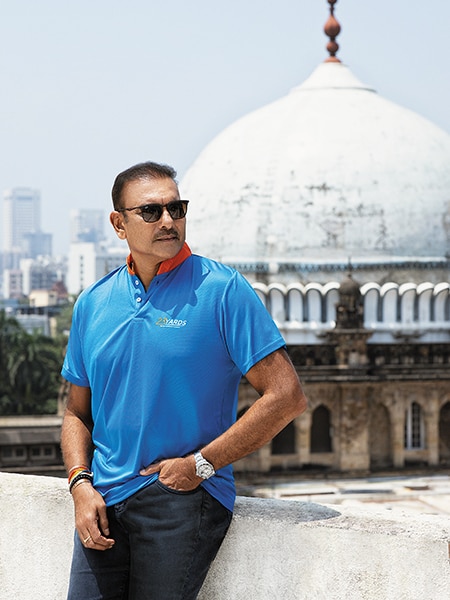 Ravi Shastri[br]The meeting with Ravi Shastri was slated to start at 4.30 pm, but one of the most successful coaches in Indian cricket history was running late. The Zoom call got postponed by one-and-a-half hours to 6 pm. “Is six your lucky number,” is the first question Forbes India asks Shastri. After all, this man, virtually overnight, shed a defensive approach to become among the most famous hitter of sixes, smacking six of them in as many balls in a Ranji Trophy match in January 1985. Once again, Shastri doesn’t defend. “Nothing like that,” he says. “I just got stuck somewhere. But it’s ironic. It’s good. If it starts at 6, so be it.”
Ravi Shastri[br]The meeting with Ravi Shastri was slated to start at 4.30 pm, but one of the most successful coaches in Indian cricket history was running late. The Zoom call got postponed by one-and-a-half hours to 6 pm. “Is six your lucky number,” is the first question Forbes India asks Shastri. After all, this man, virtually overnight, shed a defensive approach to become among the most famous hitter of sixes, smacking six of them in as many balls in a Ranji Trophy match in January 1985. Once again, Shastri doesn’t defend. “Nothing like that,” he says. “I just got stuck somewhere. But it’s ironic. It’s good. If it starts at 6, so be it.”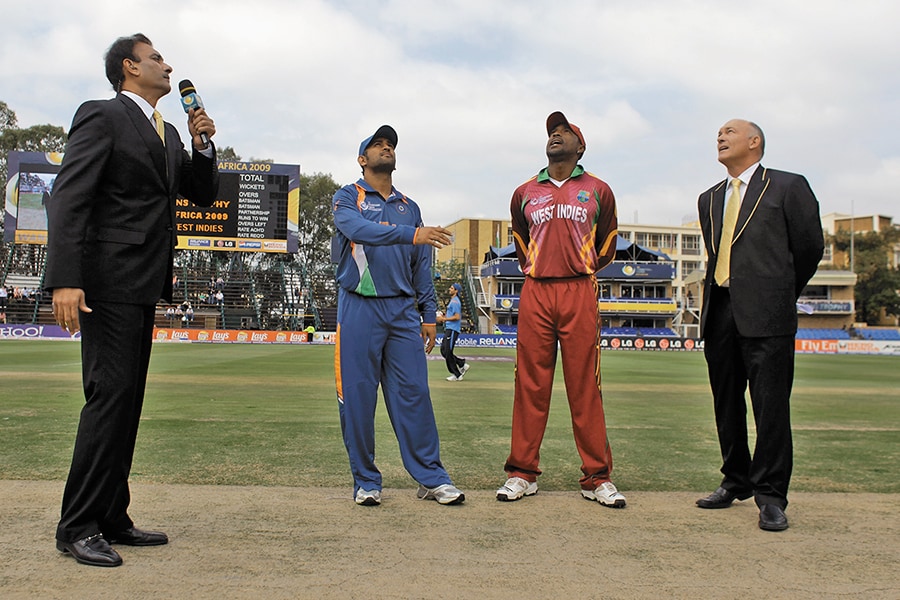 After retiring from the game, Shastri made a mark as a broadcaster with his astute analysis of the game and sharp observations
After retiring from the game, Shastri made a mark as a broadcaster with his astute analysis of the game and sharp observations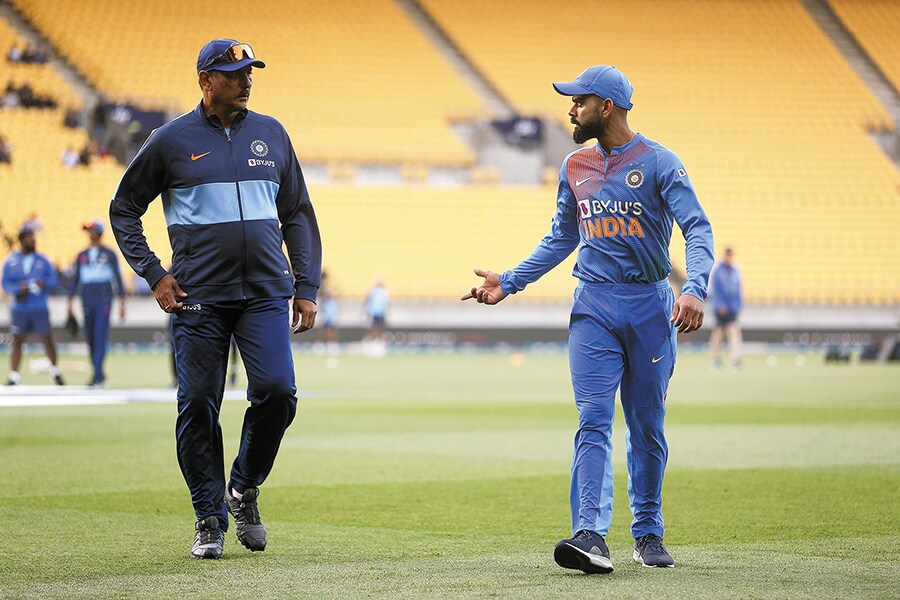 As coach, Shastri has forged a formidable partnership with skipper Virat Kohli and taken the team to the top in all formats
As coach, Shastri has forged a formidable partnership with skipper Virat Kohli and taken the team to the top in all formats 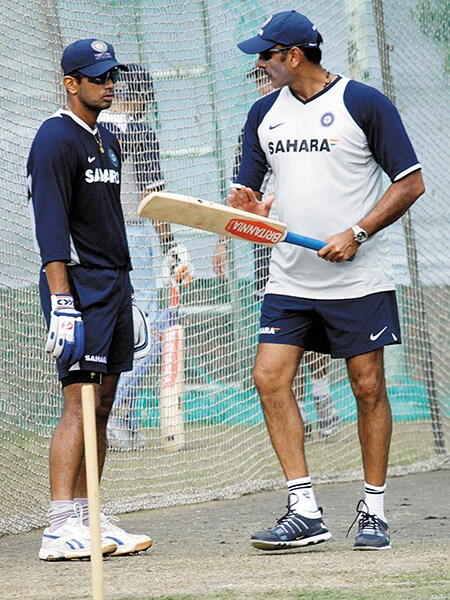 Shastri has mentored several cricketers, but he says he offers advice only if he has an answer to their problems. Here he is with former India captain Rahul Dravid
Shastri has mentored several cricketers, but he says he offers advice only if he has an answer to their problems. Here he is with former India captain Rahul Dravid 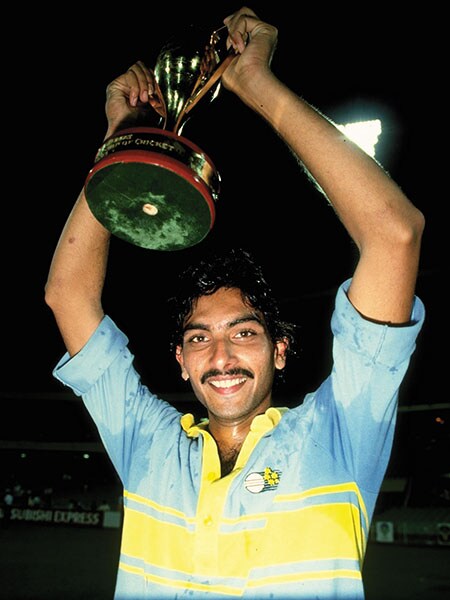 Ravi Shastri was Man of the Tournament in the 1985 World Championship. He won an Audi for his performances with the bat and ball
Ravi Shastri was Man of the Tournament in the 1985 World Championship. He won an Audi for his performances with the bat and ball